 |
| Western Darfur native Mohamed Yahya talks about
the effects of genocide on his people as panel moderator Deena Hurwitz
(far left) and Human Rights Watch counsel Jamera Rone listen. |
Reported
by M. Wood ~ February
11, 2005
(U.Va. Law News) The Arab militia who raid and plunder Sudan’s
Darfur villages are often aided by government air forces, so they took
no notice when then-USAID administrator Roger Winter gave State Department
officials a bird’s-eye view of the atrocities perpetrated on
the people of western Sudan in February 2004. Yet despite Winter’s
and other humanitarian organizations’ efforts to educate officials,
fighting in the region may again be on the upswing as the parade of
state officials over the summer has died down and the resulting international
pressure has cooled.
“The only solution to stop what’s going on in Darfur is
international intervention,” said Mohamed Yahya, chairman of
the Charlottesville-based Damanga Coalition for Freedom and Democracy
(formerly the Massaleit Community in Exile) and a native of Western
Darfur. Yahya joined Winter and Human Rights Watch counsel Jemera Rone
in criticizing the international community for moving too slowly in
Darfur and for sending the wrong message to the government there, at
a Feb. 7 panel sponsored by the Human
Rights Program and the J.B. Moore Society of International Law.
While wars in Sudan have been ongoing for decades, the government
has undertaken a campaign to wipe out civilians of the Darfur region,
hiring Arab militia, called Janjaweed—slang for outcasts
or highway robbers—to help clear out villages there. An estimated
30,000 people have been killed by Sudanese and Janjaweed forces, and
1.8 million have been displaced, including 200,000 who fled west into
Chad. The humanitarian crisis threatens even more lives because the
Janjaweed have destroyed livestock and farms.
The Sudanese government believes the villages are the rebel base for
recent insurgencies, said Rone, counsel for Human Rights Watch’s
Africa division. The government recruited men who had a bone to pick
with the rebels’ ethnic group, who are generally African farmers,
she said. There had previously been sporadic outbursts of violence,
due in part to a growing population and the desertification of the
land, but also because farmers had expanded into herders’ migratory
routes. When herders’ animals trampled the crops, tempers would
flare. The government would periodically reconcile the conflict by
paying the disadvantaged tribes, but “government solutions weren’t
working and they knew this perfectly well.” The government stopped
paying those groups and instead armed the ethnic Arab herders after
rebels attacked a Sudanese military base. They targeted civilians because
they assumed they were supporting or friendly to the rebels.
“The Sudan government was surprised because the international
community had started to make a lot of noise about it,” Rone
said. A war in southern Sudan between the Arab government in the north
and the mostly black, Christian southerners had gained international
attention as well. When a peace agreement was signed in January, no
one pressed to include a statement condemning government actions in
Darfur.
“Unfortunately the international community and especially the
U.N. failed to act seriously to stop what is going on in Darfur,” said
Yahya, a member of the Massaleit tribe, one of the groups the Sudanese
government targets. Yahya had been studying at al-Azhar University
in Cairo when he learned his village had been attacked and many of
his relatives killed. He found asylum in the United States in 2002
and moved to Charlottesville. “I feel so sad when the law which
is made to protect the people all over the world fails to protect my
people in Darfur.”
Yahya explained that at one point he considered going to Sudan to
fight to protect his people but “sometimes what you can do by
the pen is more effective than what you can do by weapons.”
More than 100 people are killed every day in Darfur, he said, most
of them women and children. Women are raped when they go outside to
get water or sticks. While many residents sought refuge in Chad, others
are surviving in the bush and living off wild fruits. While one or
two thousand African Union troops have been dispatched to the area,
they need more like 40,000, Yahya said.
He complained that the Chinese and Russians—who have oil interests
in Sudan—are blocking U.N. Security Council sanctions.
“We need people to help us….because we don’t have
any people to help us,” he said.
 |
| "It was the man himself saying this was
the right thing to do,” Winter said of Powell's decision
to use the term "genocide." |
Winter explained that Sudan, the largest country in Africa and the
home to the Sahara and the Nile, has “tectonic plates of culture,
rubbing against each other.” The current Sudanese administration
came to power in 1989 as a radical government that did not want peace
between the north and south. Without an agreement until 2005, 1.5 million
died and 4 million Sudanese were internally displaced.
Winter said the government identifies certain populations as “not
my people.” They eliminated many southerners simply by stopping
foreign aid, keeping humanitarian aid workers and organizations like
Human Rights Watch out by shutting down air service over the country,
requiring permits to enter, and threatening that medical personnel
will have to undergo physical exams to enter. These patterns continued
when war broke out in Darfur.
When Secretary of State Colin Powell used the term “genocide” to
describe Darfur’s problems in 2004, there had been no consensus
to use that label within the administration, said Winter, the former
Assistant Administrator for Democracy, Conflict and Humanitarian Assistance
at USAID. The State Department traditionally has been oriented toward
working with governments and normalizing relationships—they are
not proficient at dealing with rebels, he said. The dialogue between
the State Department and the Darfur rebels “was very thin” and
still is. Groups like USAID are more oriented toward working in the
field. “We were of the view that what was going on in Darfur
was certainly ethnic cleansing,” he said.
The day before Powell was scheduled to testify before Congress about
Sudan, Winter said Powell asked for reports from aid and human rights
organizations. “It was him considering what he read in terms
of the human rights reporting that really caused him to go in, and
in the hearing to use the word ‘genocide,’” Winter
said. “It was the man himself saying this was the right thing
to do.”
Winter said many think the State Department has moved slowly on Darfur
because it first wanted a peace agreement in the south.
Rone said the way things stand now, it looks like the United Nations
bailed out and left their work to the African Union, which isn’t
equipped to handle the growing crisis. The African Union troops are
more flexible than U.N. peacekeepers and may be more willing to take
risks, but “the whole thing is coming apart around them.” Foreign
visits caused a dip in violence over the summer, but “now they’ve
seen that the Security Council will threaten and not do anything.”
During the summer and fall of 2004 the Council twice passed resolutions
demanding that the Sudanese government disband the Janjaweed, and threatened
oil sanctions. Because the Council didn’t follow up with action,
and the southern agreement went forward without language on Darfur,
the government thinks it only has to play by the rules in the south.
Rone said China and Russia were not the only problem, and instead
charged that the key to peace is to end impunity by prosecuting those
responsible in the Sudanese government. Following the determination
of genocide by the United States, the U.N. Security Council’s
commission of inquiry found massive abuses in Sudan. Now the United
States and others are squabbling over the manner of prosecution—the
United States wants an ad hoc tribunal like that of Rwanda, while the
European Union is behind the International Criminal Court. The United
States doesn’t want to vote against the ICC—and thus against
trying human rights violators—and instead wants the vote for
the tribunal to come up first.
Yahya stressed that the Sudanese government doesn’t want peace,
and only relented over the summer because of international pressure.
The Arab government is targeting black Sudanese, whether they are Muslim
or Christian, he emphasized, and “most of the Arab governments
support the government of Sudan.”
Winter said both the White House and Congress would likely support
a stronger approach to Khartoum (Sudan’s capital). The United
States has done the yeoman’s work of making an international
issue of Darfur, he said, but the problem lies within the U.S. diplomatic
establishment, which is “looking at a slow track” to resolve
problems in Sudan. Diplomats have sent the wrong message to Khartoum
by signaling that the United States wants to “normalize” relations,
he said.
Yahya saw some hope in the appointment of southern
rebel leader John Garang as Sudan’s first vice president, a term negotiated through
the peace agreement. “We really believe that it might be changing
in the future,” Yahya said, praising Garang for his even-handed
treatment of Muslims and Arabs. But “the people of Darfur can’t
wait for even one month more.”
|